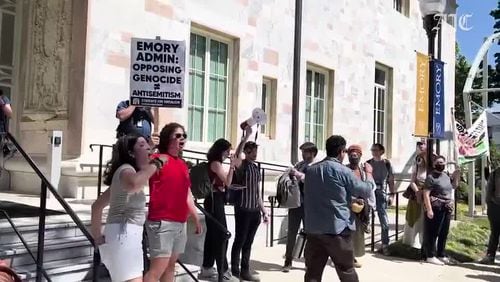Braves owner Liberty Media has taken steps toward completing its plan to issue stock in the team, including disclosing some financial details that sports franchises typically guard closely.
Liberty Media, which announced in November that it would create a “tracking stock” to allow investors and baseball fans to buy and sell shares in the Braves separate from the rest of the Colorado-based conglomerate, expects the stock to begin trading on the Nasdaq exchange by this spring. The move would make the Braves one of the few sports franchises in the world with publicly traded shares.
A lengthy document about the plan, filed this month by Liberty with the Securities and Exchange Commission, acknowledged the delicate balance in mixing sports and stocks.
If the Braves acquire highly paid players to improve the team’s short-term performance, Liberty’s filing said, that “could significantly increase operating expenses for a given year and … adversely impact the trading price” of the stock.
But on the other hand, the document said, if the Braves “focus on longer-term success by investing more heavily in … younger and less expensive talent,” that may hurt the team’s current on-field performance “and in turn could have a negative impact on ticket sales and other sources of revenues.”
The filing, which described various risks and potential benefits of the plan, provided financial data about the Braves.
It showed a drop in revenue as the team struggled on the field the past two seasons and said the Braves had a $16 million operating loss in the first nine months of last year, the most recent period available.
However, the filing revealed the Braves would have shown a healthy profit during that period if not for a $25 million expense for depreciation and amortization.
Similarly, the document showed the Braves had an operating loss of $47 million in 2014, but most of that — $29 million — also was from depreciation and amortization.
“Depreciation tax shelters are critical in the land of the bottom line,” said John Vrooman, an economics professor at Vanderbilt and an expert on sports economics. “Any good sports accountant can turn a $30 million profit into a $30 million loss with accepted accounting procedures. The revenue side of a club is fairly reliable, but the cost side is full of loopholes … all consistent with the existing tax code.”
Vrooman said the entire purchase price of a team can be amortized over 15 years. Liberty Media bought the Braves in 2007.
“Player salaries are treated as an expense twice: first as negative cash flow and second by treating the team roster as a depreciating asset,” Vrooman said.
The Braves' revenue fell from $260 million in 2013 to $250 million in 2014 and continued to decline last season as the team posted its worst record and worst attendance in a quarter-century. Through Sept. 30, the Braves' 2015 revenue was $227 million, down from $242 million at the same point in 2014, according to Liberty's filing. The company plans to report full-year results for 2015 late this month.
The Braves’ player payroll was sharply lower in 2015 than in 2014 and appears headed even lower for 2016.
In all, the Braves cut operating expenses by $25 million in the first nine months of last year, compared to the same period in 2014.
The tracking stock, called Liberty Braves Group, is intended to reflect — or “track” — the economic performance of the team and its stake in a mixed-use development, The Battery Atlanta, next to the new Cobb County stadium.
“I think you will … see us look at the team value and the mixed-use value on a separate basis and try to explain to investors that there are two pieces,” Liberty Media CEO Greg Maffei said during a presentation at an investment conference last month. “The mixed-use may be advantaged by the team, but it should not be considered part of the team. It should be advantaged by the stadium, but it’s different — has a different set of cash flows incremental to the stadium.”
He said the Braves also expect traditional revenue streams to increase with next year’s move to SunTrust Park.
“While the new stadium will be smaller, the expectation is that in many new stadiums, which are better luxury, you’re going to get much higher (ticket) prices,” Maffei said. “We’re going to own much higher percentage of things like the parking. The ancillary revenue streams around (the stadium) that we do not control at Turner (Field), we will control at The Battery and SunTrust. … We already have signed substantially better sponsorship deals.”
Subject to Liberty Media shareholder approval and other conditions, the plan calls for Liberty shareholders to have their stock replaced with corresponding shares in each of three tracking stocks: one tied to the Braves, one to the company's 60-percent stake in satellite radio provider Sirius XM and one to its other holdings.
Also, Liberty intends to raise $200 million with a rights offering of additional Braves shares. That money would be used largely to repay $165 million borrowed by the Braves from Liberty for the stadium.
Creation of the tracking stocks is “not a spin-off” of the Braves or the other businesses, which will remain part of the same overall company, Liberty’s filing said.
The filing said that based on discussions with Major League Baseball, no one other than Liberty chairman John Malone, Maffei and Braves CEO Terry McGuirk would be allowed to own 10 percent or more of the Braves’ stock without approval of the MLB commissioner’s office.
The Braves long have been a small part of publicly traded companies — first Turner Broadcasting, then Time Warner and since 2007 Liberty Media. But this would be the first time the Braves have been a separate stock, requiring increased disclosure of their quarterly financial results.
About the Author






